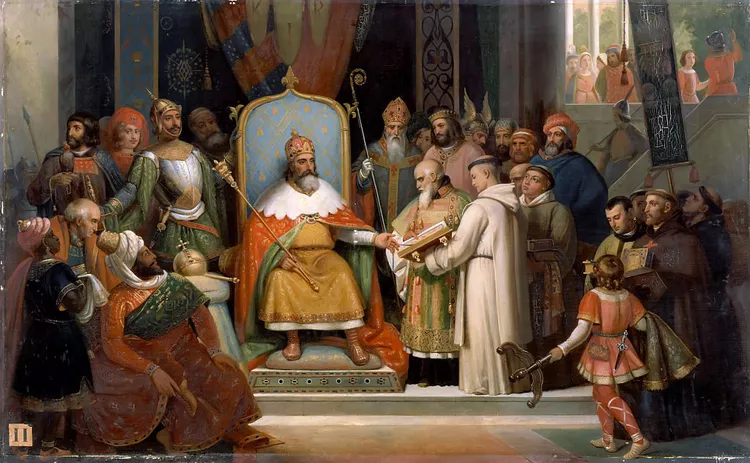Beethoven (1770–1827) lived during a period of profound political and cultural transformation in Europe. His birthplace, Bonn, was part of the Holy Roman Empire, a vast and complex political entity that had existed for over a thousand years. This essay explores the historical and political background of Beethoven’s time, focusing on the Holy Roman Empire, its structure, governance, and eventual dissolution, while addressing its origins and Vienna’s role as the capital.
Origins and structure of the Holy Roman Empire
The Holy Roman Empire was established in 800 when Charlemagne, King of the Franks, was crowned Emperor by Pope Leo III, reviving the Roman imperial title in Western Europe. By Beethoven’s time, it had evolved into a loose confederation of over 300 semi-independent states, including kingdoms, principalities, duchies, free cities, and ecclesiastical territories, covering modern-day Germany, Austria, and parts of Italy and France. The empire was not a centralized state but a decentralized system where the emperor’s authority was limited, and local rulers held significant autonomy. The emperor was elected by a college of prince-electors, reflecting the empire’s fragmented nature.
Vienna as the capital
Vienna became the de facto capital of the Holy Roman Empire due to the dominance of the Habsburg dynasty, who held the imperial title almost continuously from 1440 to 1806. As the Habsburgs’ seat, Vienna was the political and cultural heart of the empire, attracting artists, musicians, and intellectuals. Beethoven moved to Vienna in 1792 to study with Joseph Haydn and establish his career, benefiting from the city’s vibrant musical scene and patronage from the Habsburg court and aristocracy. Vienna’s status as a cultural hub made it a natural destination for Beethoven, shaping his development as a composer.
The electorate system
The electorate system was a cornerstone of the Holy Roman Empire’s governance. The emperor was chosen by a group of prince-electors, initially seven: the Archbishops of Mainz, Trier, and Cologne, and the secular rulers of Bohemia, the Palatinate, Saxony, and Brandenburg. This number later increased, but the system ensured that no single dynasty could monopolize the imperial throne. The electors wielded significant influence, often requiring concessions from candidates, which further decentralized imperial power. This system distinguished the empire from hereditary monarchies, maintaining a balance among its powerful states.
Bonn and the Electorate of Cologne
Beethoven was born in Bonn, the capital of the Electorate of Cologne, one of the three ecclesiastical electorates within the Holy Roman Empire. The Electorate of Cologne was ruled by the Archbishop-Elector, who held both spiritual and temporal authority. During Beethoven’s youth, the elector was Maximilian Francis, a Habsburg and brother of Emperor Joseph II, who governed from 1784 to 1801. Maximilian Francis embraced Enlightenment ideals, transforming Bonn into a cultural and intellectual center. He founded the University of Bonn in 1786 and supported the arts, creating an environment that nurtured Beethoven’s early musical development. Bonn’s governance was thus tied to the empire’s ecclesiastical structure, with the Archbishop-Elector acting as a local prince within the broader imperial framework.
Governance in the Holy Roman Empire
The Holy Roman Empire’s governance was highly decentralized, with each state maintaining its own government, laws, and administration. The emperor’s authority was limited to imperial institutions, such as the Imperial Diet, and matters like defense and foreign policy. Local rulers, including prince-electors and other nobles, held significant power, often superseding the emperor’s influence. This decentralization allowed for regional diversity but also weakened central authority, making the empire a complex mosaic of semi-autonomous entities.
German territories before unification
Before Germany’s unification in 1871, the German-speaking lands were a patchwork of independent states within the Holy Roman Empire. These included principalities, duchies, and free cities, each with its own ruler and governance structure. After the empire’s dissolution in 1806, these states formed the Confederation of the Rhine under Napoleon’s influence, followed by the German Confederation (1815–1866) established by the Congress of Vienna. This fragmentation persisted until Prussia unified most German states into the German Empire in 1871, excluding Austria.
Why Austria was left out of unified Germany
Austria’s exclusion from the unified Germany of 1871 resulted from its focus on its multi-ethnic empire, which included non-German territories like Hungary, Bohemia (modern day Czech Republic), and parts of Italy. After the Holy Roman Empire’s dissolution, Austria prioritized consolidating its own empire over joining a German nation-state. The Austro-Prussian War of 1866, won by Prussia, cemented Austria’s exclusion from the North German Confederation, which later became the German Empire under Prussian leadership.
Tolerance and openness in the Empire
During Beethoven’s lifetime, the Holy Roman Empire experienced increasing religious tolerance, influenced by Enlightenment ideals. In 1781, Emperor Joseph II issued the Patent of Toleration, granting religious freedom to non-Catholic Christians, including Lutherans and Calvinists, within the Habsburg lands. In Bonn, Maximilian Francis implemented similar reforms, fostering a culturally open environment by founding the University of Bonn and supporting the arts. Vienna, as a cosmopolitan hub, attracted diverse intellectuals and artists, creating a relatively tolerant atmosphere. However, tolerance varied by region, and the empire remained predominantly Catholic, with some restrictions on religious minorities. This period marked a shift towards greater acceptance, reflecting the intellectual currents of the time.
The end of the Holy Roman Empire
The Holy Roman Empire dissolved in 1806 when Emperor Francis II abdicated following Napoleon’s reorganization of Germany into the Confederation of the Rhine. Napoleon’s victories and the empire’s internal weaknesses, exacerbated by centuries of decentralization, rendered the imperial structure obsolete. This marked the end of a political entity that had shaped European history for over a millennium.
The Holy Roman Empire’s decentralized structure, cultural richness, and eventual dissolution profoundly shaped Beethoven’s world. From Bonn, a cultural hub under the enlightened rule of Maximilian Francis, to Vienna, the empire’s vibrant capital, Beethoven’s life and music were influenced by this complex political landscape.



